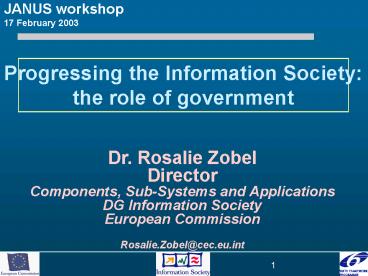JANUS workshop - PowerPoint PPT Presentation
1 / 11
Title:
JANUS workshop
Description:
Dr. Rosalie Zobel. Director. Components, Sub-Systems and Applications. DG Information Society ... Rosalie.Zobel_at_cec.eu.int. 2. Policy Context. Lisbon Strategy ' ... – PowerPoint PPT presentation
Number of Views:35
Avg rating:3.0/5.0
Title: JANUS workshop
1
JANUS workshop 17 February 2003
Progressing the Information Society the role of
government
Dr. Rosalie Zobel Director Components,
Sub-Systems and Applications DG Information
Society European Commission Rosalie.Zobel_at_cec.eu.
int
2
Policy Context
ERA EuropeanResearch Area
Enlargement
Candidate countriesare full partners in FP5
FP6
FP6, Eureka, COST, National RTD Programmes
towards a Single Market for Research
Other policies
Single Market, Single Currency, Security of
Europeans, Sustainable Development, ...
Broadband access, e-business, e-government,
security, skills, e-health, ...
3
Directorate C - Mission Statement
To contribute to the EU Lisbon objective of
making Europe the most competitive
knowledge-based economy by 2010 by implementing
the vision of Ambient Intelligence the European
Research Area through fostering RD mass
deployment of enabling micro-, nano-, and
opto-electronic components systems, emerging
embedded technologies innovative applications
services in the areas of health, transport,
environment government
4
The role of Government in IS progress
- IS transforms government eGovernment
- key component of eEurope 2002, 2005 and IST/ERA
- Europes next challenge
- emerging research, development and deployment
area - eGovernment Ministerial Conference, 3-4 July,
Como, Italy in co-operation with the
Italian Presidency
eGovernment impacts on businesses,
citizens and policy making (ePolicies)
5
Two core challenges for Government in IS
Citizens
Businesses
eGovernment SERVICESinteractive, user-driven
GOVERNMENT transformation dynamic,
service-driven
6
eGovernment Research our environment
- eGovernment an emerging challenge for Europe
- Addressed by various programmes, policies,
initiatives - at local, regional, national and European levels
- e.g.
- regional eGov programes under Structural Funds
- national programmes in MS and Enlargment
countries - part of DGINFSO policy activities
- IDA, eTEN at European level etc
- But also from private industry (eGov business
departments).
7
eGovernment Research IST FP6
- European Research on eGovernment the
responsibility of FP6 - IST Research on eGov Call 1 - Strategic
Objective 3.1.9 Networked businesses and
governments - Related parts of the IST WP2003-2004
- e.g. broadband, dependability/security,
eInclusion, mobile user and worker, etc - Priority7 in FP6 Citizenship, democracy and
new forms of governance - Priority 8 in FP6
- ERA-NET
- Research for Policy Support
8
IST Programmes Impact on Policiesin DG INFSO
other DGs
To offer a vision for policy making
- Contribution to
- Research policy
- Technology analysis trends
- Enterprise policy
- Competitiveness, SMEs, sectoral analysis,
innovation - Regional policy
- Government re-engineering, inclusion
- Enlargement policy
- Geographical focus (e.g. Baltics, SE Europe,
eEurope) - Employment policy
- Relocation, telework, new employment trends
- Sustainability policy
- Social environmental sustainable development
9
Why Socio-economic Research in IST ?
1. A driving focus of FP5 an integral element
in FP6 2. To understand ICT impact on economy
society 3. To glue IST RTD activities together
for the benefit of society 3. Leveraging effect
on EU policy
10
FP5 legacy6 Socio-economic Research Clusters in
KAII
The Industrial Organisationscenarios intangible
assets structural change innovation
Work Employmentimpact on society eWork and
employment issues eInclusion technology adoption
Sustainable Developmentcorporate practices
transition to knowledge economy corporate social
responsibility (CSR) sustainability economic,
social environmental
Legal RegulatoryFrameworksvirtual
organisationscontract law, ADR schemesDRMs,
identity IPR managementconsumer protection
Regional Development digital regional
economies statistical indicators,
benchmarking rural regional development public-p
rivate partnerships
Statistical Indicatorsproductivity,
intangibles New Economy Statistical Information
Systemmeasurement harmonisation impact assessment
11
80 IST projects on eGov and many interactions
with related activities
KM tech.
eTen
IDA
Security
Network
Policy
eGovernment Research INFSO -C6
eBusiness
eInclusion
eWork
Regional aspects
eHealth
International aspects

